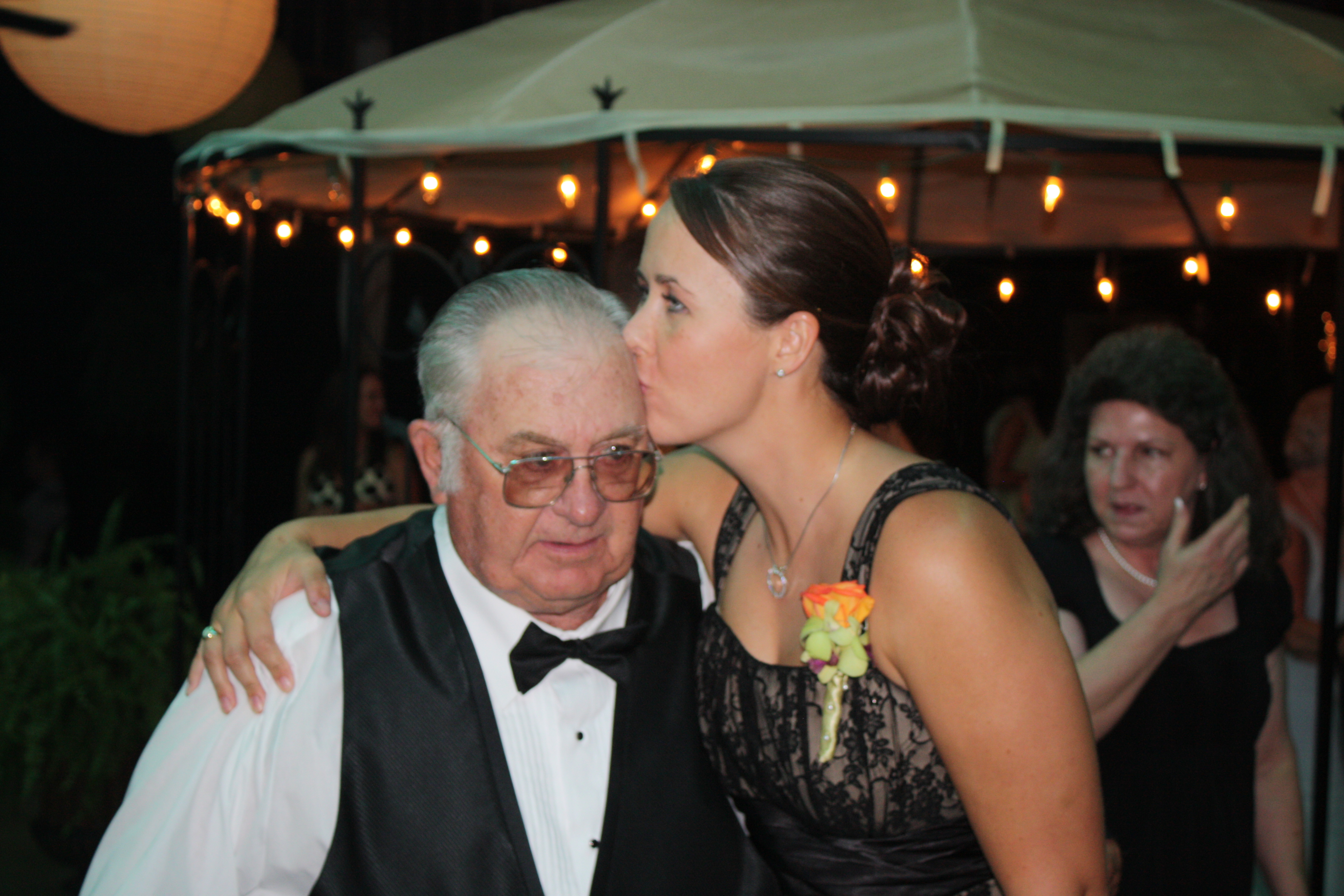
by john | Apr 12, 2017 | Amazing Grace, Writing
The serialized novel Amazing Grace that I’m publishing here grew out of a walk through the cemetery in my hometown. I grew up in a small town called Sharon, SC. Actually, I grew up outside of Sharon, in a rural area called Bullock Creek, but Sharon was the nearest post office and elementary school, so that’s close enough for government work. In Sharon there’s an old Presbyterian Church, dating back to the late 1700s, and the entire front row of the cemetery, with just a few notable exceptions, has my last name on the stones. Most of the folks buried in that front row that don’t share a name with me, still share a lineage.
My people have been there for a long time. My mother is buried there, my brother-in-law is buried there, my infant nephew, my uncle, my cousin Marion (remember the Bubba story Rest High on that Mountain? That’s where the name came from.) Marion’s parents, my paternal grandparents, my Uncle Erskine, who survived the Battle of the Bulge and received the Silver Star for bravery. There’s also a three-sided monument in the cemetery tracing my people back to England and a bunch of the ancestors that are not buried there.
I’m invested in that little town, to say the least. I was walking through the cemetery one afternoon, visiting Wayne (my brother-in-law), Uncle Ed, and Mama, when I got a sentence stuck in my head. “I walk through the cemetery, with the ghosts of my people swirling around my feet.”
I wrote poetry for years, and I recognize a good line when I see it. That’s a good line. But it felt like more than a poem to me. My sister Bonnie has been after me for years to write a book about our family, to share some of the stories that we’ve created over the years with the world. That may never happen, at least not when I have to look at these people over Thanksgiving dinner, but this felt like it could be something kinda like that.
So I talked about it with my mom. She didn’t answer, because unlike Lila Grace Carter, dead people don’t talk back to me. Like Lila Grace, and honestly like every Southerner I know, I do talk to dead people. I talk to dead people all the damn time. I ask my mom for advice. I tell my brother-in-law that he’s a dick for dying young. I tell my uncle he’s an asshole for killing himself. I talk to dead friends, and ask them to look out for one another. I ask Aunt Julia and Uncle Erskine to keep an eye on folks for me. It’s a thing. I do it, and I bet if you scratch beneath the surface of most Southerners, especially folks who grew up in small towns or in the country, you’ll find a one-sided necromancer.
As I sat there on the tombstone in the next row over, facing Mama (sorry, I know it’s a little irreverent, but I’ve always been of the impression that if people didn’t want us to sit on tombstones, they wouldn’t make them ass height), I decided that I would write the story of my family, and the story of my small town. So that’s what Amazing Grace has become. Lila Grace Carter is a big chunk of my mother. She’s a strong woman, unafraid to jump right in and do what she thinks needs doing. She doesn’t always look before she leaps, and that sometimes causes trouble for her, and she’s got a wicked tongue.
My mother was all of those things. She did not, as far as I know, believe in the supernatural outside of the Bible or communicate with dead people. There are other people in the book that are real as well. The Dead Old Ladies’ Detective Agency is even named after my mother and her two best friends, Helen “Tot” Good and Faye Russell (who was born a Comer). Miss Tot died last year, but Miss Faye is still kicking and feisty as hell. The three of them for a long time did in fact make up the Western York County grapevine. Anytime anything happened in Bullock Creek, Hickory Grove, or Sharon, one of the three of them knew about it and passed the word along to the other.
There are two big changes I’ll be making moving forward with the book. One is the name, and the other is location. Not the name of the book, though. I like Amazing Grace, and it lends itself to more “Grace” book titles if I decide this won’t be a stand-alone. I expect if I do write another book in this world that the Dead Old Ladies Detective Agency is going to have a larger role, because they have turned into one of those small ideas that are just fun as hell, and deserve a little more space to breathe and run than they have in this project. But the author’s name is going to change.
I’ve written a ton of books under my real name, but this is a book of a totally different style and flavor, and I’d like a chance to reach a different audience. That audience might be put off by looking at the also-bought recommendations on Amazon and seeing a bunch of horror novels. Or maybe not. But it hurts me not at all to publish this project under a pseudonym, and if I decide I don’t like it, I can always rebrand it as my own later. It’s not going to be any kind of secret, and I’m pretty sure the name I’m using will be JG Wyatt, which is my two initials and my mother’s maiden name. I’m not locked into that yet, but about 75%.
The other thing I’m going to change is fictionalizing the geography. I initially set the book in a fictional version of Lockhart, SC. Which is fine, I know Lockhart fairly well, and can write that part of the country. But the town I’ve been using in my head for the map has been Sharon, with a fair bit of York tossed in for good measure. So I need to just make it a fictional town so that I’m not confusing anyone who is actually from those towns and reads the book. That also means that I need to change the references to John D. Long Lake in the book, and take out the references to the Susan Smith murders that happened there.
This is what happens as you write a book. Things change. Some great ideas pop up and need to be expanded, so you either find room to grow them in that book or put them on the list of other books you want to write when you get time. Some ideas that seem great turn out to be untenable, so they get cut, or manipulated, or just flat out deleted. I’m not one of those writers who saves every word I’ve written and sometimes pulls things out of mothballs later. I don’t have the recall or organizational system for that. So I’ll just go through and rewrite it.
And I can do that, because as yet, no one has paid me any money for this book. I’m giving it away as it evolves, as an experiment. So I can continue to experiment and do whatever the hell I want with it. And I will. I’m having a lot of fun with this book, and I hope y’all are too.
Oh yeah, and the old folks that are the featured images for most of the posts about this book? They’re my parents. Most of these shots are taken at weddings of family members, and the pic of my mom in the teal jacket is one of my favorite pictures of her. The pic of my dad in the tux this week is absolutely my favorite picture I’ve ever taken of him.
I’ll probably pop back in once in a while to tell y’all about other stuff with this book. Right now I’ve published nine chapters, and I’ve written 20, with at least ten more to go. I think this book feels like it’s going to be about 75K, or just a little longer than the last Black Knight book.
Thanks for stopping by. See y’all later.
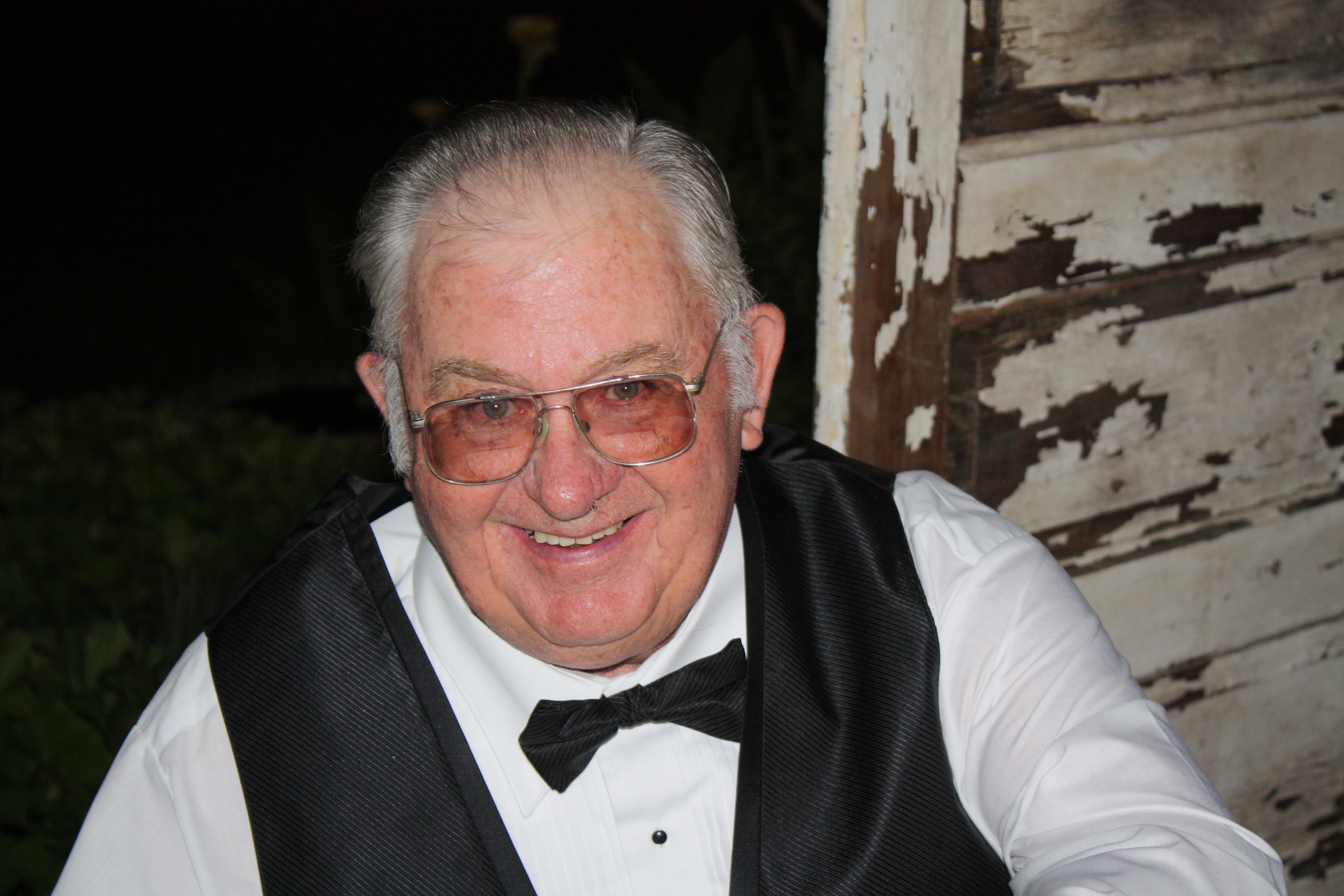
by john | Apr 10, 2017 | Amazing Grace, Fiction, Serialized Fiction, Writing
This is the 9th chapter of an ongoing serialized novel that I’m working on and posting up here in rough draft form. To read other chapters, CLICK HERE. Wednesday I’ll have a post about some changes to the book that I’ve found need to happen through this process, and the evolution of a novel, so if you’re enjoying these posts, come back
9
Walking amongst the dead always brings me peace somehow. I know it’s the opposite for a lot of people, but I find the company of the resting dead awful relaxing. As much time as I spend with the restless dead, it’s exceedingly peaceful to walk among those that have gone on from here.
So that’s what I did. I walked along the front row of the cemetery, right there on Front Street, with my truck parked all cattywumpus like I’d been drunk as Cooter Brown when I pulled into the parking lot. I lingered for a second in front of the three-sided monument that Cousin Bowman had collected money from everybody in the family to put up back in the 1964. My daddy gave him twenty dollars and bought three four copies of the book he wrote about our family’s travels across the ocean from England to the South Carolina upstate, and told Bowman to get the hell out of his face and not to never ask him for another dollar while he was trying to eat.
In defense of Daddy’s manners, he said he was trying to eat some of Aunt Eller’s coconut cake, and her coconut cake always was everybody’s favorite. She’d make this three-layer white cake so moist if you squeezed it you could get water for days. Ellen always made Cool-Whip icing with a bunch of shaved coconut all through it, so you got some coconut in the icing between the layers of the cake, too. It wasn’t like some of them store-bought coconut cakes, which is basically a white sheer cake with some coconut sprinkled on top. I tried for years to learn how to make cake like Aunt Eller, but I never could figure it out. Then she passed, and then Daddy passed, and I never married, so I didn’t have anybody to teach me, nor anybody to eat it, so I just quite trying. It’s probably been a month of Sundays since that old Tupperware cake carrier has seen any use.
I looked at that monument, tracing the Carters, and the Thomases and the Feemsters all the way back to whatever little piece of English soil they sprang up from. The original Johnny Thomas in this part of the world was from Wales. He was about old Sheriff Johnny’s grandpappy with about a dozen greats in front of it. Me and Johnny always knew we were some kind of kin, but being Southern, we just called it “cousins” and let it go at that. My mama always could rattle off what number cousin you were to somebody and how many times removed, but I never got the hang of it.
I walked a little further, and took a seat on a headstone in front of my Granny’s stone. I was sitting on Mr. Bo Mickle’s stone, and I usually made it a point to apologize to Mr. Bo for disrespecting him that way, but I’ve been doing it so long by this point that I reckon Mr. Bo would have found some way to let me know if it bothered him.
“Hey, Granny,” I said. She wasn’t there, of course. Granny died when I was about thirteen, and she didn’t linger but a couple of days. I met her right here the morning after her funeral and watched her walk into the light. It wasn’t like she walked up into the clouds like the end of Highway to Heaven episode, but there was a bright white light, and she told me she loved me, and told me to be good, and then she turned around and went away. So I knew she wasn’t listening in, but somehow that made it easier to talk.
“Granny, I’m having a terrible time with this one. The poor little girl wants my help so bad, but her mama and daddy won’t have any of it. Her mama won’t, anyhow. That preacher Turner has got his hooks into her so deep you’d think she was going to make a big donation or something. I’m sorry, that wasn’t very Christian of me. But he just makes me so mad sometimes. It’s like he knows I want to help people, and he keeps trying to get in my way anyhow.”
I got down off the top of Mr. Bo’s rock and moved over to sit cross-legged on the grass right in front of Granny’s stone. I’d done this forever, but the older I got, the harder it was to get up off the grass when I was done. I reckoned it wouldn’t be too many more years before I was going to have to have a cane or some kind of walking stick if I was going to go traipsing around in cemeteries. This one wasn’t too bad, but some weren’t maintained as good, like the one where Pap was buried.
Yeah, Granny and Pap didn’t lay to rest together. They weren’t even in the same town. Granny was right here in Lockhart, but Pap was way over in Chester. He remarried after Granny went, and that was about the last we saw of him. It was like he wanted nothing more than to forget our family and go be with a new one. I didn’t like it, and I could tell it hurt Mama something awful, but we respected the old man’s wishes and left him alone. He lived a long time after Granny passed, ’til he was well into his nineties. I only heard about it when he died because I read the obituary. There was no mention of our family in the listing of relatives. Since I wasn’t family anymore, I didn’t go to the visitation.
I did go to the funeral, though. I stood back away from everybody and watched them lay the old man to rest. When all the rest of the mourners got back in their cars, I walked up to the graveside and stood there for a minute watching the men lower the casket into the dirt. I was just about to walk back to my truck when he stepped up beside me.
“You still see ghosts, Lila Grace?” my dead grandfather asked me.
I nodded. I didn’t really want to talk to him. I didn’t know what to say. This was the man who had made me a rocking horse for Christmas when I was three years old. A rocking horse I had until I was a grown woman and gave it to a young couple at the church who had a little boy who loved to play cowboy. This was also the man who abandoned my mother when she needed a parent most, when she was burying her own mother in that ugliest cycle of life. The man that turned his back on my family for over two decades, and now stood next to me while I watched his body being lowered into the ground and tried to decipher my feelings.
“I expect you got some questions. If you’d see fit to come with me for a minute, I’d like to answer ‘em.”
Well, the old man knew he had me then. I was so curious when I was little that he used to call me “Cat.” “Get on out of here, Little Cat,” he’d say when he caught me snooping in his or Granny’s closets, trying to find Christmas presents or birthday presents, or just old pictures of him from the War or of Granny when she was young woman.
None of that curiosity faded as I grew up, and getting older did nothing to tame that curious Little Cat, so I followed the old man. He walked around to the back of my truck and motioned at the tailgate. I opened the tailgate and sat down on it. He sat next to me, and this let us sit together without being forced to look at one another. I liked that arrangement.
“Best thing about driving a truck, Little Cat,” he said. “You carry your car, and a table, and a seat with you all in one.”
“Don’t call me that,” I said, my voice suddenly that of a seven-year-old girl again.
“Why not? It’s what I’ve called you for years.”
“No,” I corrected. “It’s what you used to call me. You ain’t called me nothing in years.”
“Well,” he said, looking at the laces on his boots. He was dressed like I always used to see him, in a checked flannel shirt, blue jean overalls, and brown work boots. Most ghosts present wearing what they died in, but some wear what they’re most comfortable in. Sometimes they’ll get a look at their funeral, and all of a sudden it will switch to what they were buried in. Dickey Newton showed up one day wearing nothing at all, dead as a doornail and naked as the day he was born. I sent Dickey away and told him not to show his face, or any other part of himself, around me until he learned to manifest himself at least a pair of britches.
“What are you still doing here, Pap?”
“I stayed to see you. I’m glad you came to the funeral.”
“I felt like it was the right thing to do.”
“For me or for you?”
“For me. What you thought hasn’t been on my mind much since you wrote us out of your new life.” I could hear the bitterness in my voice, but I didn’t care. He hurt my feelings when he just up and abandoned us like that, and I reckoned he could know it.
“I am sorry about that, Lila Grace.”
“If you hadn’t done it, I reckon you wouldn’t have nothing to be sorry for.”
“Well, you’re right about that. It was wrong, and it was selfish.”
“So why’d you do it?”
He didn’t say anything for a long time, and when he finally spoke, his words were slow, like he was picking them carefully. “After your Granny died, I was a mess. We had twenty-seven good years together. I guess that ain’t really true. We had twenty-four good years, with enough bad days throughout to make up a year or two, and the last year was pretty rough. When your Granny got sick, I didn’t do nothing but take care of her for a year. It was hard on me, but that’s what a husband is supposed to do.”
“Well, when she was gone, I didn’t have that purpose any more. I couldn’t remember what it was like to be anything more than the man with the sick wife, and every time I saw your Daddy, or any of my family, all I saw was her face. It didn’t take long until I couldn’t stand that anymore, so I left.”
“You always told me that a man faces up to what’s hard.”
“That’s true. I just wasn’t much of a man right then. So I went away, and I made myself a new family, and I loved them. I know you probably don’t want to hear that, but I did. It was a different love than what I had for y’all, but it was a true thing just the same. But I never forgot you. I never forgot any of you.”
“I never forgot you, neither, Pap. I tried real hard, but I didn’t.”
“Thank you for that.” I saw a bright light start to form out of the corner of my eye, and Pap turned to see it. “Looks like my train’s ‘bout to pull out of the station,” he said.
“You stayed here just to tell me all that? What if I hadn’t come?”
“You would eventually.” He smiled at me, got off the back of my truck, and walked into the light. It flashed brighter than the sun, then popped out, leaving me blinking and rubbing my eyes. I was alone in the cemetery, and I went back over to where the men had been running the backhoe and I shed a tear over my Pap’s grave. Not for his death, but for the life we never shared.
I sat there for about an hour, just talking to Granny about Jenny, and Shelly, and the idiot Baptist preacher, and her soaps that I still watched every day so I could keep track of who’s alive and dead for her. After a while, though, my knees started really giving me fits, and my spine started to knot up down in my lower back, so I got up and moseyed on back to the truck. I ran my fingers across the stones as I walked, liking the feeling of the different granites used. Some were buffed to a high polish, but plenty were either too old for that, or just never cared to pay for it.
I got to my truck and looked at myself in the mirror. I was born lucky – I have a complexion that lets me cry without turning into a red, blotchy mess. I fixed my makeup and put the truck in gear, pointing the old girl down the street toward the sheriff’s office.

by john | Apr 7, 2017 | Book Spotlight, Evolution, Writing

I’ve been writing fiction since I was in sixth grade, when I wrote a short Silmarillion fanfic telling how the Valar created the halflings. (And now let us pause to appreciate the colossal nerdiness on display in that sentence.) Since then I’ve written dozens of short stories, but only one novel: Blood Family, published in September 2016. Part of what I had to do in the course of writing that book was to figure out how to write a novel—or, more precisely, how I write a novel.
For my short stories, the ideas seemed to come from everywhere and nowhere: a dream, a snatch of conversation, a phrase in an essay, a newspaper headline. When I sat down to write the novel that became Blood Family, I initially started with a similar approach. I knew I wanted my first novel to say something about family, because I’d tried many times before to write about what it was like growing up in a highly dysfunctional family with Southern Gothic tendencies. Unfortunately, none of those attempts came out right, perhaps because they were all personal essays. For my novel I decided to try using fiction to express what my childhood and adolescence had taught me about family.
I also wanted to debunk the popular notion that “every parent out there is just doing the best they can.” Oh, really? When Josef Fritzl held his daughter Elisabeth captive in a basement in Austria for 24 years, raping her the entire time and impregnating her with seven of his children, he was just doing the best he could? When Brice McMillan tied his 13-year-old son to a tree for 18 hours in the summertime in North Carolina, causing the boy to die of dehydration and heat stroke, he was just doing the best he could too? No. They weren’t. They could have done better. There are countless examples from history and the news—and a few from my own family—demonstrating that not every parent out there is just doing the best they can. I wanted to tell a story from the point of view of an adult who had grown up in a family where the adults did not always have the children’s best interests at heart.
If I’d been writing a short story, the conceptualization phase probably would have stopped there, but this was a novel, and I was on a different mission. Most of my short stories have been situated squarely in the mainstream literary realist tradition, with a few adventurous ones sliding sideways into what literary theorist Tzetvan Todorov would call “the fantastic,” which he positions between “the uncanny” (it looks like it might be supernatural, but it isn’t) and “the marvelous” (it’s definitely supernatural). In fantastic stories, the question of the supernatural is raised without being resolved one way or the other, and I liked that—but not for a good reason. I liked the fantastic because it allowed me to dabble in the shallows of the supernatural without diving in and committing to it. “To commit is to be in danger,” James Baldwin said, and I was afraid of that danger. I was afraid of writing openly supernatural stories that the literary elite might look down upon. So I equivocated, writing stories about eerie occurrences that might or might not have a rational explantion.
My novel constituted a decisive break with that practice because, frankly, I was tired of fucking around. I knew the only way I could sustain my enthusiasm and dedication through an entire novel was to write something I really cared about and enjoyed, and for me, that means stories of the other world: ghosts and demons and myths and legends and gods and monsters and magic; cults, covens, religions; spells that really work; portals that really go somewhere. And when I surveyed that rich vein of story ideas, it seemed to me that ghosts, and the unquiet dead in general, would be very useful in telling a story about a family whose parents have visited their sins upon their descendants. You see this kind of thing a lot in Gothic fiction: houses that are reputed to be haunted, for instance, symbolizing the influence of the past upon the present. In my novel, I decided to see what kind of mileage I could get out of making a haunted house actually be haunted, even as I sought to deploy the resonant themes, the psychologically rich characters, and the carefully crafted sentences of mainstream literary fiction.
In short, Blood Family represents the coupling of a theme you might expect to see in a mainstream literary novel (how unhealthy families mangle their descendants) with a story element from genre fiction (the unquiet dead). The entire novel flows from that dyad. I’ve used a similar dyadic structure to develop the basic idea for my next novel, which I’ve already begun working on. I believe this simple structure is a key that can unlock more novels than I could ever possibly write—but I’m going to do my damndest to get as many of them down as I can before I join the ranks of the unquiet dead myself.
Bio: Brent Winter is a writer and editor in Carrboro, North Carolina. Blood Family is his debut novel. To learn more about Blood Family, including where to buy it, visit Brent’s author site. He’s currently at work on a novel that, although not a sequel to Blood Family, is set in the same universe—one where downtown Atlanta hides a strange little neighborhood called D Street that you can’t find on your own; someone who’s already been there has to take you first.

by john | Apr 5, 2017 | The Writer's Journey, Writing
I sat down with my friend, co-editor, and Falstaff Books author Emily Lavin Leverett at Mysticon, and we shot the shit about her writing, her background, and anything else that came to mind. You can check subscribe to the podcast on iTunes, or wherever you get your podcasts, or you can go here and listen.
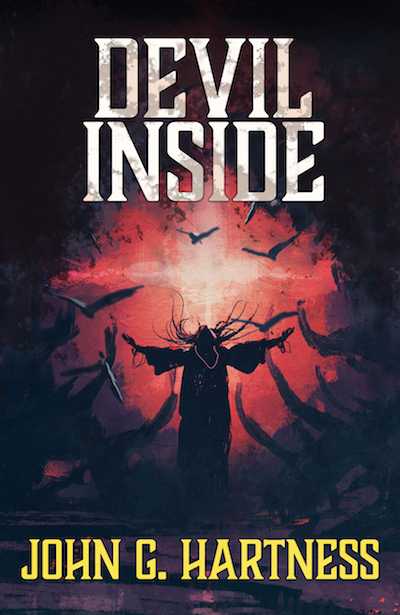
by john | Apr 4, 2017 | Promos/Giveaways, Writing
I have a bunch of stuff coming out in the next couple months, and I’m fortunate enough to have an amazing cover artist, Natania Barron, working on them. She’s already got the covers knocked out for the next Quincy Harker book, which will be out this month sometime, the next Shadow Council book, which will hit e-stores next month, and a brand new standalone project that’s coming later in the spring.
 First up, here’s the cover for Devil Inside, the next Quincy Harker novella. Devil Inside continues the 8-book crossover event that I’m tentatively calling Quest for Glory. If anyone comes up with a better name, I’m all for it.
First up, here’s the cover for Devil Inside, the next Quincy Harker novella. Devil Inside continues the 8-book crossover event that I’m tentatively calling Quest for Glory. If anyone comes up with a better name, I’m all for it.
In this story, Harker is dealing with some of the fallout from Season 2, then moves on to hunting down the first of the Implements of the Archangels that he has to find. His quest takes him to Charleston, SC, and of course it isn’t as easy as he hoped.
He has to deal with the city’s mystical guardians, who aren’t very trusting of a random new wizard in town, plus a sorcerer who wants to sink the city beneath the ocean, AND he has to find a magical book and his best hope lies in a dotty shopkeeper that speaks only in Shakespeare quotes.
Life can get tough when you’re the Reaper.
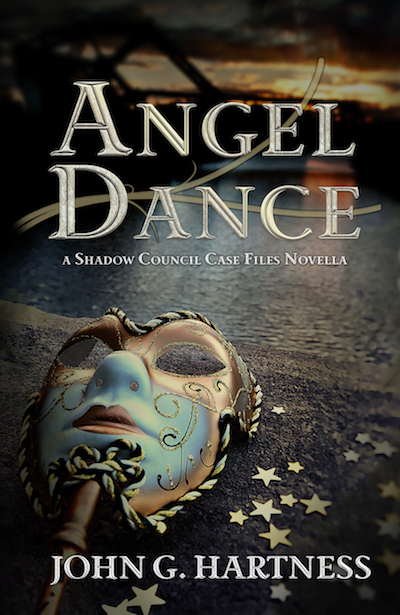
Angel Dance is the next episode in Quest for Glory, and I’m currently writing this one. This novella features Adam, Frankenstein’s monster, in New Orleans looking for the Horn of the Herald. The Horn was played by the Archangel Sealtiel in the War on Heaven, and it’s now lost in a sea of musical instruments in one of the greatest cities for music in the world. Needle, meet haystack.
And of course that can’t be the only thing going on, so Adam has to deal with the fact that someone or something is hunting down practitioners of magic in the Crescent City and murdering them, including one of Adam’s few friends. He doesn’t like it when people hurt his friends.
Don’t make him angry. You wouldn’t like him when he’s angry. For real, folks, he’s friggin’ Frankenstein’s monster, why would you piss him off?
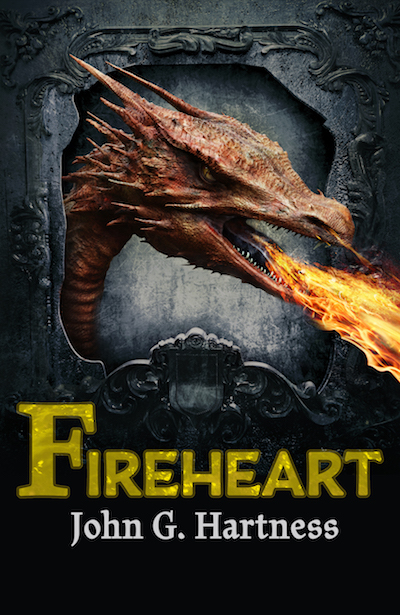
Fireheart is a bit of a departure for me. One, it’s a full-length novel, and y’all know I don’t write that many of those. Two, it’s more of a YA thing than a snarky adult thing, which was a fun changeup to write. And three, it’s a standalone rather than part of a series, so this book is all you get with these characters. It’s something I’ve had kicking around for a while, and I finally dragged it out, finished it, and polished it up. It oughta be out late spring.
In Fireheart, a mountaintop removal mining operation wakes up a sleeping dragon. That’s not a euphemism, they really wake up a damn dragon. Of course, the dragon has been asleep for a few hundred years, and he’s pretty grumpy when his alarm goes off. Rachel Hampton’s father is one of the head geologists at the mine, and he’s injured in the attack.
Rachel’s life is complicated enough with her best friend crushing on her and the cute boy she ran into on her bike (literally!). Then she’s riding through the woods and sees this really cute guy standing in the woods. Butt naked. With golden skin. Because dragons don’t always wear their scales.
So there’s a love triangle. And a dragon. And black helicopters. Because why wouldn’t there be black helicopters?
That’s a little news on the latest upcoming releases. As always, you can join my email list to find out about all this stuff, too! There’s a link over on the side of the page.












